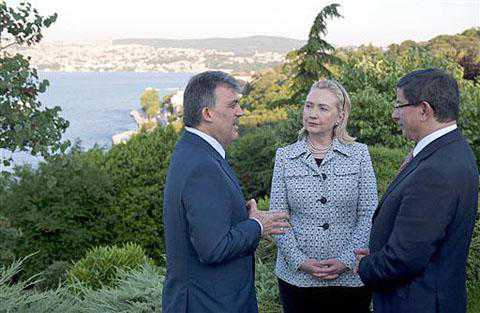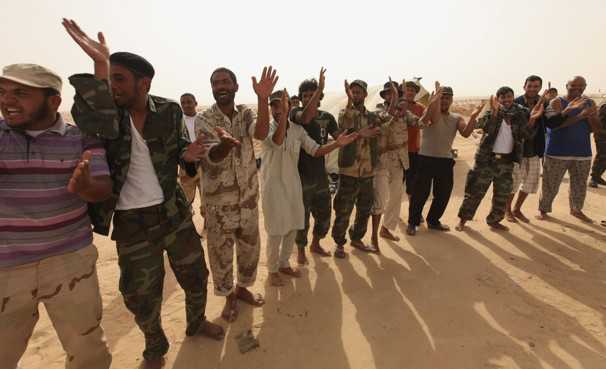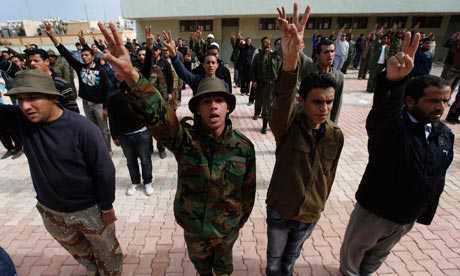Turkey Recalibres Its Policy On Libya
Publication: Eurasia Daily Monitor Volume: 8 Issue: 139
July 20, 2011
By: Saban Kardas
Turkey has hosted an important meeting, which marked the drastic transformation its policy on Libya has undergone. Although Turkey initially expressed strong opposition to military intervention against the Gaddafi regime, over time it adjusted its policy and managed to coordinate it with Western powers and various Muslim nations that have been working to end Gaddafi’s rule. The Libya Contact Group, bringing together these powers, held its fourth meeting in Istanbul, co-chaired by Turkey and the UAE, on July 15.
Predating the meeting, Turkey had undertaken several steps to forge closer ties with the Libyan rebels. Despite its opposition to the use of force, Ankara later agreed to the transfer of the operation to NATO command and joined the Libya Contact Group. However, Turkey’s insistence on a negotiated settlement, and its slow pace in cutting its ties with Tripoli arguably drew a wedge between Ankara and Tripoli-based National Transitional Council (NTC) (EDM, April 19).
While distancing itself from Gaddafi, Turkey progressively repaired its ties with the NTC. After joining the Contact Group, Turkey intensified its criticism against the Gaddafi administration. Prime Minister Recep Tayyip Erdogan argued that a new period was to start in the history of Libya and called on Gaddafi to relinquish power. More importantly, following the temporary closure of the Turkish embassy in Tripoli the day before, Erdogan emphasized that Turkey would continue to work with the NTC to find a political solution (www.mfa.gov.tr, May 3).
During the second meeting of the Contact Group in Rome in the same week, Turkey argued for an immediate ceasefire and insisted on a roadmap it proposed earlier in April to end the conflict (Hurriyet, May 5). However, the inability of the Contact Group to agree on determined action and the deepening of the civil war rendered Turkey’s proposal largely ineffective.
Turkey then moved toward consolidating ties with the opposition, which came in mid-May when the chairman of the NTC, Mustafa Abdul-Jalil, visited Turkey and met the president, prime minister and foreign minister. Although Turkish leaders described the NTC as a legal and credible representative of the people of Libya, they stopped short of extending official recognition. Satisfied with Turkey’s de facto recognition of their administration, Abdul-Jalil emphasized that they would discuss ways to improve trade with Turkey and how Ankara could assist the country’s reconstruction and provision of humanitarian aid. He also sought to make the case that the rebel forces held sympathy toward Turkey’s position and earlier protests against Turkey in Benghazi were due to a misunderstanding. More importantly, he said the NTC would honor all the agreements signed in the past by the Tripoli government, meaning that Turkish business investments in the country would be protected. Granted, reflecting perhaps a divergence with Turkey, Abdul-Jalil underlined the necessity of the military option to topple Gaddafi, though he avoided any request for Turkish military assistance (Anadolu Ajansi May 23; Zaman, May 25).
The real boost for Ankara’s ties with the NTC came when Davutoglu visited Benghazi. Arguing that Turkey and Libya shared the same destiny, he extended support to the Benghazi administration by describing it as the legitimate representative of the country, and adding that Turkey would soon appoint an ambassador to Benghazi. At the same time, Davutoglu made a commitment to provide $100 million in project credit and $100 million in cash credit, in addition to the $100 million Turkey previously provided. Davutoglu reiterated Turkey’s call for a roadmap, based on an immediate ceasefire, delivery of humanitarian assistance, an end to Gaddafi’s rule, and maintenance of Libya’s unity, and argued that a ceasefire should be established before the beginning of Muslim holy month of Ramadan (Anadolu Ajansi, July 3).
The Turkish government also took a major step, by issuing a decree to freeze the assets of Gaddafi and his family in Turkey, imposing a ban on their entry into Turkey, and opening the way for seizing the control of Arab-Turkish Bank which was partly owned by Libyan Foreign Bank. The decree also spelled out other measures to implement the arms embargo in line with the UN Security Council Resolution (Radikal, July 3). Mahmoud Jibril, the NTC’s spokesman on foreign affairs, paid a visit to Turkey to finalize the loan deal, where he also requested that Ankara grant access to the frozen assets. The Turkish side, however, declined to unfreeze the assets, citing the existing UN resolutions (Hurriyet Daily News, July 6).
Ahead of the Contact Group meeting in Istanbul, Davutoglu reiterated the need to reach a truce before Ramadan, while arguing that the Turkish proposal would constitute the basis for discussions. Although Ankara also extended an invitation to China and Russia, they declined to attend, arguing that the issue should be handled in the UN Security Council (Sabah, July 14). In his address at the opening of the meeting, Davutoglu expressed support for NTC’s request for the release of $3 billion from the frozen assets and its equal distribution in Tripoli and Benghazi (www.mfa.gov.tr, July 15).
While recognizing the NTC as the legitimate governing authority in Libya until an interim authority is set in place, the contact group took various decisions to aid the political transition, and assist the NTC in political, economic, financial and administrative fields. For instance, the final declaration urged participants to “open credit lines to the NTC corresponding to 10 percent to 20 percent of the frozen assets by accepting them as collateral” (www.mfa.gov.tr, July 15).
Although the conclusions outlined a roadmap for the political transition after the end of Gaddafi’s rule and decided to heighten pressure on Tripoli, the meeting failed to present clear answers as to how the current military stalemate will be overcome. Likewise, despite the incorporation of some of the elements from Turkey’s own roadmap, there was no decision to halt military operations in Ramadan. Granted, the process leading from the outbreak of the crisis in Libya to the holding of the Contact Group meeting in Istanbul reflects the high degree of flexibility on the part of Turkey. More importantly, it demonstrates Ankara’s determination to work closely with the United States, as was reflected by the warm welcome US Secretary of State Hillary Clinton received from Turkish leaders during her stay in Turkey.
https://jamestown.org/program/turkey-recalibres-its-policy-on-libya/





